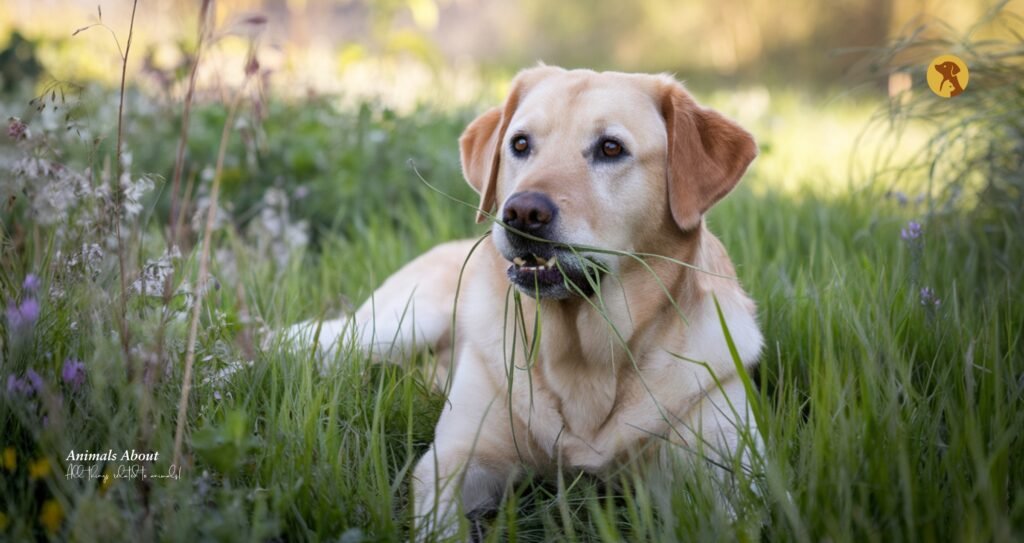Why Do Dogs Eat Grass and Then Vomit?

Is It Normal for Dogs to Eat Grass? Let’s Clear the Confusion Have you ever caught your dog chewing grass in the backyard like a little lawnmower? You might have panicked, thinking, “Why is my dog eating grass?” or “Is something wrong with my dog?” The truth is, dog eating grass is surprisingly common, and in many cases, it’s completely normal. Dogs are curious creatures. They explore the world with their mouths, and sometimes grass just happens to be part of that experience. In fact, numerous studies suggest that up to 79% of dogs occasionally eat grass. It’s often considered a part of normal dog digestive behavior, especially if it’s not followed by vomiting. For some dogs, eating grass is a soothing, instinctive action, possibly inherited from their wild ancestors. But when your dog eats grass and throws up shortly after, it raises important questions about canine nausea, diet deficiencies, or gastrointestinal issues. If your dog also barks excessively along with eating grass, it could be a sign of emotional distress. Here’s why your dog might be barking too much and how to respond. Why Dogs Eat Grass and Vomit – What’s Really Going On? Dogs eat grass and vomit for several reasons. It’s not always something to worry about, but it can be a sign of something deeper. One of the most common explanations is that the dog has an upset stomach. Grass, with its fibrous texture, may act as a mild irritant that triggers vomiting. It helps expel whatever is bothering your dog’s digestive system. This is a classic case of canine self-medicating behavior, often observed when dogs experience discomfort. There’s also the theory that dogs might eat grass simply because they enjoy it or because they are bored or anxious. Yes, stress plays a major role in unusual behaviors like this. If your dog is often alone, lacks stimulation, or goes through changes in their environment, they may develop a dog eating grass habit as a form of coping. Moreover, pica in dogs—a condition where animals eat non-food items—can explain compulsive grass eating. This condition is sometimes connected to dog diet deficiencies. If your pup lacks fiber or essential nutrients, grass might offer a temporary solution, though not a healthy or sustainable one. Dog Eating Grass Causes: Physical, Emotional, or Nutritional? When looking at dog eating grass causes, it’s crucial to consider all angles. Not all grass eating is created equal. Some dogs do it occasionally and never vomit, while others make a habit out of it and vomit every time. Let’s break down the common reasons: Some dog owners report that their dogs vomit only after eating certain types of grass—usually broadleaf varieties with rough edges. These blades can irritate the lining of the stomach and trigger vomiting, sometimes with yellow or green bile. This is where the concern for dog gastrointestinal issues arises. Dog Vomiting Bile After Grass: Should I Be Concerned? Seeing your dog vomit bile after eating grass can be alarming. The yellow or green fluid, often mistaken for food, is actually bile—an acidic substance produced in the liver to aid digestion. If your dog vomits bile frequently, especially on an empty stomach, they may be suffering from canine nausea or excessive stomach acid. This could be due to irregular feeding times or long gaps between meals. When the stomach stays empty too long, acid builds up and causes discomfort, leading your dog to seek relief by eating grass. Once ingested, the grass irritates the stomach lining just enough to induce vomiting and get rid of the acid. If this happens occasionally, it may not be serious. However, dog vomiting bile after grass more than once or twice a week isn’t something to brush off. It may be a symptom of chronic gastrointestinal issues such as gastritis, inflammatory bowel disease, or food allergies. Your vet might suggest diagnostic tests or a change in diet. When Should You Worry About Your Dog Eating Grass and Throwing Up? It’s easy to dismiss the occasional grassy snack. But when the behavior becomes regular, it might point to a more serious problem. So, should I worry if my dog eats grass? The answer depends on several signs. Seek veterinary attention if your dog shows: These symptoms could be warning signs of an underlying issue like gastrointestinal inflammation, parasites, or even organ dysfunction. Early intervention can save your dog from long-term discomfort and you from expensive treatments down the road. Veterinary Advice for Grass Eating and Vomiting in Dogs Veterinarians often recommend a combination of observation and lifestyle changes before jumping to medical treatments. If your dog is healthy, active, and only occasionally eats grass without further symptoms, no treatment is usually necessary. But if vomiting is consistent or accompanied by other signs of illness, testing for dog gastrointestinal issues may be necessary. Your vet may run blood work, fecal exams, or ultrasounds to rule out any internal problems. They might also suggest switching to a high-fiber dog food or adding digestive supplements. Dogs with dog diet deficiencies may need more than standard kibble—consult your vet about balanced diet options with essential fatty acids, prebiotics, and greens. How to Help Your Dog Avoid Eating Grass If you’re tired of watching your dog graze the lawn, here are some ways to discourage this behavior naturally: Supervise Outdoor Time: Keep an eye on what your dog eats during walks or playtime in the yard. FAQ Disclaimer: This content is for informational purposes only and does not replace professional veterinary advice. Always consult your veterinarian for guidance specific to your pet’s health. Published by animalsabout.org.
Dog Breeds Health Issues: What You Should Know

If you’re an animal lover like me, you’ve probably noticed how unique every dog breed is not just in looks or personality, but in how they feel day to day. Some breeds bounce around like they’re invincible, while others seem to visit the vet more often than we’d like. It’s heartbreaking to see our furry friends struggle, but understanding dog breeds health issues can make a huge difference in keeping them happy and healthy. So, let’s dig into why some breeds face more challenges and how we can care for them the right way. Why Do Some Dog Breeds Have More Health Problems? Have you ever wondered why your neighbor’s Bulldog snores like a freight train or why your friend’s German Shepherd limps after a long walk? It often comes down to canine breed genetics. Purebred dogs, while beautiful and distinct, are sometimes prone to genetic disorders in dogs because of selective breeding. Over generations, breeders focused on traits like size, coat, or that adorable squished face sometimes at the expense of health. Take flat-faced breeds like Pugs or French Bulldogs, for example. Those cute little snouts can lead to breathing issues in flat-faced dogs, a condition called brachycephalic syndrome. Or consider large breeds like Great Danes, prone to joint problems in large dog breeds like hip dysplasia. These breed-specific health problems aren’t random; they’re tied to their DNA, passed down through hereditary dog conditions. Common Health Issues to Watch For Not every dog will face these challenges, but knowing the common illnesses in dog breeds can help you spot trouble early. Here are a few examples: It’s not all doom and gloom, though! Understanding these canine health risks means we can take action to help our pups thrive. How to Care for Breeds with Health Concerns So, what can we do about these dog health concerns? First, knowledge is power. If you’re bringing home a purebred, research its breed-specific health problems. Ask your breeder about health screening for dog breeds. Reputable ones will test for things like hip dysplasia or eye conditions. Next, tailor their care. For instance: And don’t skip those vet visits! Vet advice for dog owners is gold: regular checkups can catch problems early, especially for breeds with hereditary dog conditions. Are There Healthier Dog Breeds? If you’re wondering, “Why do some dogs get sick often?” while others seem to dodge the bullet, you’re not alone. Mixed breeds often have fewer purebred dog issues thanks to a wider gene pool. But even among purebreds, some stand out as the healthiest dog breeds. Australian Cattle Dogs and Border Collies, for example, tend to have fewer dog breeds with few health problems, living long, active lives. Your Role as a Dog Parent Being a dog owner is a big responsibility, especially when it comes to best care tips for purebred dogs. It’s about more than just love (though that’s a huge part!). It’s watching for signs of trouble, feeding them right, and giving them the exercise they need without pushing too hard. For me, seeing my dog wag his tail after a good day makes every effort worth it and I bet you feel the same. So, next time you’re cuddling your pup, think about their breed’s unique needs. Whether they’re a tiny Chihuahua with a big personality or a massive Mastiff with a gentle heart, understanding dog breeds health issues helps us give them the longest, happiest life possible. What’s your dog’s breed, and how do you keep them thriving? I’d love to hear your stories! Disclaimer: The information provided on animlasabout.org is for educational purposes only and is not a substitute for professional veterinary advice. Always consult a qualified veterinarian for your pet’s health concerns.
